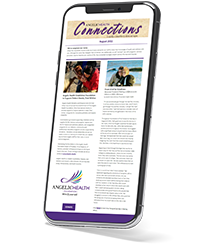Hospice is All About Living
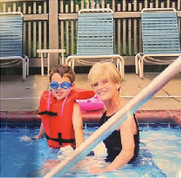
Shown here:
While on hospice, the author’s mom
enjoyed some of the time she had left
with grandson Dan Farrell.
RIGHT: Tom McFarland, at church
with his mother, even while on
hospice with Angelic Health.
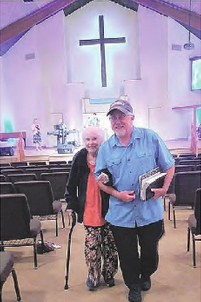
Upcoming holiday season is the perfect time to monitor care for those you love.
Please pass the potatoes. And how about hospice?” Certainly, the middle of Thanksgiving dinner might not be the best timing to talk about end-of-life care, but as extended families gather this holiday season, the weekend can be an opportune time for folks to make their wishes known well in advance.
“Look, this is not a comfortable discussion, but it's important and we need to have it. It's usually not a one and done discussion,” says Dan Mikus, CEO of Angelic Health, an organization that provides hospice and palliative care across the region. Mikus suggests that you ask family members to think about it and circle back to it in a few weeks.
“When we're older, we all have our own ideas of how we want to go,” he notes. “Offer your own feelings. 'What are your thoughts about that?' ” This encourages an open dialogue. It is good to make wishes clear and to put it in writing.
Author's note: Prior to my mom's death from cancer in 2003, she was on hospice care. I recently filled out a Five Wishes form (a free advance care planning program available at fivewishes.org) to let my husband and kids know what I would want should my end be near.
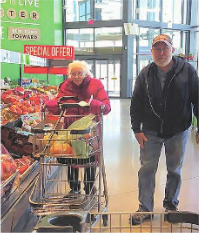
Shown here:
Tom McFarland and his mom were
able to enjoy many outings together while
she was on hospice.
Mikus says patients often wait for their doctors to talk to them: “Most doctors won't talk about hospice, especially primary care doctors who are very busy. There's also a misconception that the patient will get doped up. People on hospice are going out to dinner. They are going to family reunions. If they are traveling, we can cover them. We can help them do that without pain and discomfort.” One patient recently enjoyed a great couple of weeks in Wildwood with family, he adds.
While on hospice, my mom booked the Presidential Suite at a resort and invited us to join her for facials, manicures, and pedicures. We swam in the pool and walked the golf course.
Hospice also gives a patient and family time to plan. Mikus uses this analogy: “If you go to the doctor today and you're not feeling like yourself and he says, 'the good news is you're pregnant. But you're going to give birth in two weeks.'You will have no time to prepare.”
At the end of life, there is preparation as well. “You need that time,” Mikus says.
Patients appreciate having time to get affairs in order; hospice often grants them more time, not less. He says, “Statistically someone on hospice lives longer.”
Time was short for my mom, but it was several cherished weeks longer than predicted.
Shelly Faleska’s mom was on hospice for six months before passing away this month. “They were so attentive,” she says. “They set things up right away. They were genuine, kind, compassionate - also professional. They helped us a lot; otherwise, we would have been floundering. They gave her a book that she went through. It encouraged you to say the things you want to.”
Her mom reached out to a former co-worker and was able to give her valued trinkets and express how much their friendship meant. “They encouraged her to plan her own funeral,” she notes. “The day of the funeral we knew we were honoring her wishes.”
Faleska appreciates that they helped walk them through things they wouldn't know or understand.
When it came time to discuss hospice for Tom McFarland's mom, who had battled leukemia for years, he says, “it was a family decision. My youngest sister was her caretaker. My sister started interviewing different hospices. We liked the attitude of Angelic Care - the aides and nurses were caring. That was the main selling point: they were going to care for Mother the way we do.”
McFarland says the pain motivated them. “This is a really good reason to have hospice,” he advises. “You're not going to survive what has befallen you. You want to be in your own house, have nurses, not be in pain, and enjoy some things. My mom had a number of great grandchildren. I could bring them over. We went to church.”
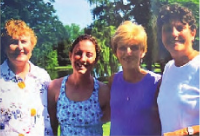
Shown here:
While on hospice, the author's mom, second
from right and in photo at right, booked
a luxury suite at a resort and invited
family and friends to join her.
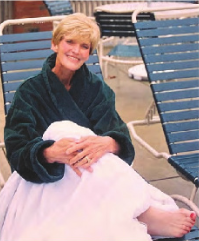
His mom enjoyed the woodpecker who would visit the birdfeeder outside her window. McFarland and his mom loved doing crossword puzzles together. He appreciates the memories of that time. She passed away a year ago just before Thanksgiving.
“One thing we always hear is, 'You know what? We only wish we could've come on sooner,'” says Ottilie Parsons, a clinical liaison with Angelic Health. “We do soup to nuts. The patient has received some hard news. The doctor has told them they have some sort of terminal illness. Our care starts with that first phone call. We are right there by their side. It's more than that. They don't know the next step. It's news they didn't expect or if they did expect they are still in shock.”
I wasn't ready to give up the fight, but Mom was determined to enjoy whatever days she had left. Hospice helped me accept that.
“It's hard news but we always have hope. Hope just changes its face. When hope for a cure is no longer, “then hope for a pain and symptom-free experience. We use gentle language. When time is short, having family around the patient and a team supporting the patient is important.”
Mom had a mix of medication that allowed her to be active but not in pain; she enjoyed visits with family, and close friends visited with her in her garden.
“Hospice is an option when patients have a life-limiting condition. A doctor has given a six month or less prognosis. Some patients live longer, some come off. It's a very fluid system,” says Parsons. “We use a team approach. That's what makes us different from others. The RN Case Manager is the coordinator. There is a social worker who provides emotional support and links patients with community resources. It is optional to have an aide five days a week. The aide can handle personal care, such as grooming, and keeping the environment clean and healthy.”
Angelic Health also provides spiritual care, as a non-denominational counselor. As needed, they also provide equipment and supplies, such as a hospital bed, wheelchair, over-the-bed table, bed pads, gloves, and wipes. They can arrange for medications to be delivered.
“We also do bereavement—13 months of cards and calls or visits to the family,” Parsons says. “We never push. It is something to support them through holidays and anniversaries.” Parsons says she is humbled by the whole company, that their hearts are in the care.
“It's like the sex talk with your kids. Let's not be afraid to talk about it,” says Margie Barham, Angelic Health's director of public relations. “It's a tough topic, but let's talk about it before you need it. Hospice is about how you live. We provide quality of life for whatever you have left.”
Barham also notes that hospice is 100 percent covered by Medicare, Medicaid, and most private insurances.
I'm so grateful my mom enjoyed a walk in the woods with my stepfather in the afternoon. That night she slipped away peacefully, sleeping in her own bed. Hospice care helped facilitate that.
Reprinted here with permission from SNJ Today.
Author: Stephanie Farrell
